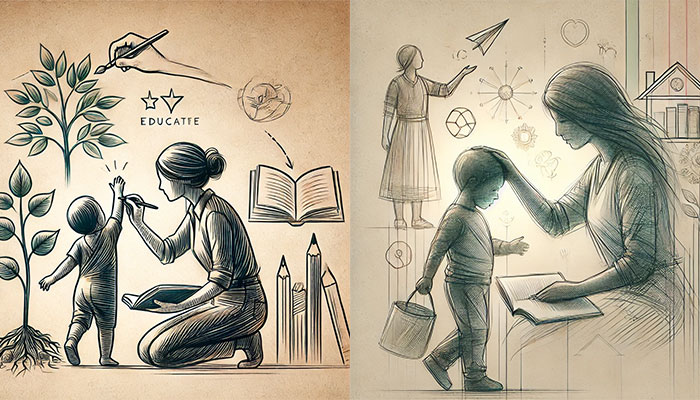Parenting styles and child development
It is through parent styles that a child grows emotionally, socially and cognitively. There are four major parenting styles – one for each of which psychologists assign a developmental outcome to a child.
Authoritative Parenting
Characteristics:
- High responsiveness and high demands.
- Expects and rules but also is kind and supportive.
- Encourages independence while maintaining limits.
Impact on Child Development:
- Higher self-esteem and self-confidence.
- Better emotional regulation and socialisation.
- Superb grades and analytical skills.
- Lower risk of behavioral problems.

Authoritarian Parenting
Characteristics:
- Low responsiveness and high demands.
- Disciplined, Obedient, Controlled.
- Not much emotional openness; communication is a one-way street.
Impact on Child Development:
- Increased anxiety, fear, or resentment.
- Social impairment and low self-image.
- Sensitiveness to rebelliousness or inferiority complex.
- Conformity and punishment in the extreme, but not always with a high price tag.
Permissive Parenting
Characteristics:
- High responsiveness and low demands.
- No boundaries and very little regulation.
- Discipline if the child’s happiness.
Impact on Child Development:
- Poor self-discipline and impulse control.
- Fascination with power and boundaries.
- Higher risk of behavioral problems.
- Can be creative and highly social, but also ill-advised with duty.

Neglectful/Uninvolved Parenting
Characteristics:
- Low responsiveness and low demands.
- Very little participation in the child’s life, and no help or advice.
- Often comes from personal reasons like stress or mental illness.
Impact on Child Development:
- Bad emotional control, low self-esteem.
- Lack of building connections and trust.
- Academic underachievement.
- Riskier behaviours (substance abuse, etc.).
Top Traits of Parents and Children
- Cultural Contexts: Cultural conditioning influences parenting styles and the concept of what is "workable".
- Temperament of the Child: The temperament of a child has an impact on their reaction to parenting.
- Parent-Child Relationship: Parent and child chemistry is very important.
- Flexible: Parenting can happen only if styles are changed as children develop and the environment evolves.
A Balanced Approach
Affirmative parenting is, according to the literature, generally best for the children. But be adaptable and sensitive to the individual needs of a child. And each parenting style has advantages and disadvantages, but a well-developed, communicative and structured home environment is the way to raise healthy children.
W3information helps you to get knowledge about the new information. This site under copyright content belongs to w3information. By using this site, you agree to have read and accepted our terms of use, cookie and privacy policy.
 Mobile Security: Tips to Keep Your Phone Safe
Mobile Security: Tips to Keep Your Phone Safe
 Top Mobile Apps for Productivity
Top Mobile Apps for Productivity
 How to Optimize Your Mobile Battery Life
How to Optimize Your Mobile Battery Life
 Mobile Gaming: The Best Games in 2025
Mobile Gaming: The Best Games in 2025
 Comparing iOS vs Android
Comparing iOS vs Android
 The Future of 5G in Mobile Phones
The Future of 5G in Mobile Phones